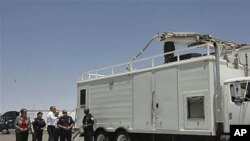A day after President Barack Obama visited the U.S.southwestern border with Mexico, a congressional panel is questioning whether the border area is more or less secure today than it has been in the past. The president is calling for comprehensive immigration reform, but many Republican lawmakers are insisting that more be done to improve border security first.
At a House Homeland Security hearing Wednesday, Republican Subcommittee Chairman Michael McCaul of Texas disputed a statement in March by Homeland Security Department Secretary Janet Napolitano that security along the U.S. border with Mexico is better than ever before. And he also challenged remarks made Tuesday by the president.
"I have urged the president to visit the border, but to do more than to deliver a political speech," said McCaul. "And while I am pleased that we have added more resources to the border, it is not secure, and it has never been more violent or dangerous than it is today. And anybody who lives down there will tell you that."
McCaul is calling for more National Guard troops to be deployed at the border, and also for the State Department to designate Mexican drug cartels as foreign terrorist organizations.
Obama went to El Paso, Texas, Tuesday to challenge lawmakers to reform what he called a "broken" immigration system, saying better laws would lessen the numbers of people attempting to work in the U.S. illegally.
Obama proposed giving a path to citizenship to the nation's estimated 11 million undocumented immigrants, and making it easier for students from other countries to work and start businesses in the United States. Most Republican lawmakers oppose a pathway to citizenship, saying it amounts to an amnesty.
The president defended his administration's efforts to secure the borders along the southwestern United States, saying they have resulted in more guns, currency and drugs being seized along the border, and fewer people trying to cross illegally.
"Also, despite a lot of breathless reports that have tagged places like El Paso as dangerous, violent crime in southwest border counties has dropped by a third," said Obama. "El Paso and other cities and towns along the border are consistently rated among the safest in the nation. Of course, we shouldn’t accept any violence or crime, and we have more work to do. But this progress is important."
At Wednesday's House hearing on Capitol Hill, the experts were divided on whether or not the U.S. border with Mexico is safer or more dangerous. Grayling Williams of the Department of Homeland Security said he would agree that the border is safer.
"We are not seeing the level and the overall viciousness of violence that you see in Mexico, the beheadings, the constant shooting of police officers and you know, military personnel," said Williams.
But the state and local officials present at the hearing from the border states of Texas and Arizona all said that they disagree with the Obama administration - they do not believe the southwestern border is more secure today than in the past, and they said many residents live in fear of spillover violence from Mexico. One of the most outspoken was Tom Horne, the State Attorney General of Arizona.
"In October, the Phoenix area experienced its first beheading, where someone walked into a Chandler apartment and found a head in one part of the room and the body in another," said Horne. "Two months ago, in Casa Grande, midway between Phoenix and Tucson, 15 cartel members had a firefight with bandits in an attempt to steal their drugs. Just a few weeks ago, one of my Special Agents in the Attorney General’s Office was shot by a suspected cartel operative in the Phoenix area."
Horne told the hearing he is suing the Obama administrating for neglect for failing to secure the border. The Obama administration also is suing the state of Arizona because last year the state passed a measure that would have allowed police officers to check the immigration status of anyone suspected of being in the U.S. illegally. The Obama administration says immigration is a federal matter and not a state matter.
Some of the lawmakers at the hearing said F.B.I. statistics show that the U.S. border with Mexico is more secure now than in the past because the figures do not include crimes, such as kidnapping and extortion, that often are perpetrated by drug cartels.
Congressional Panel Questions Security of US Border With Mexico
- By Cindy Saine




